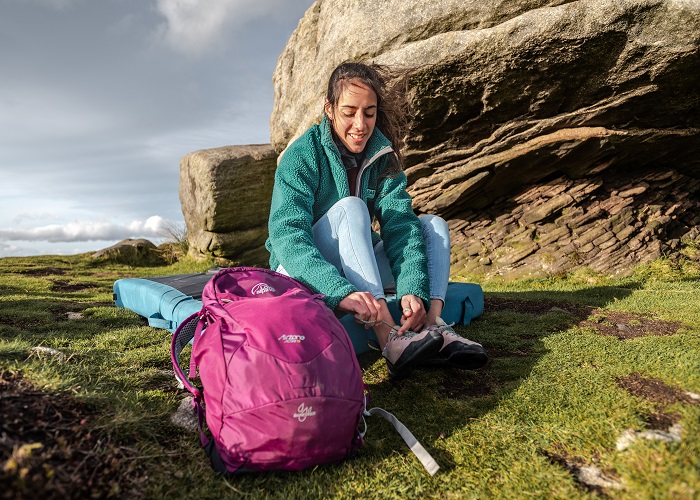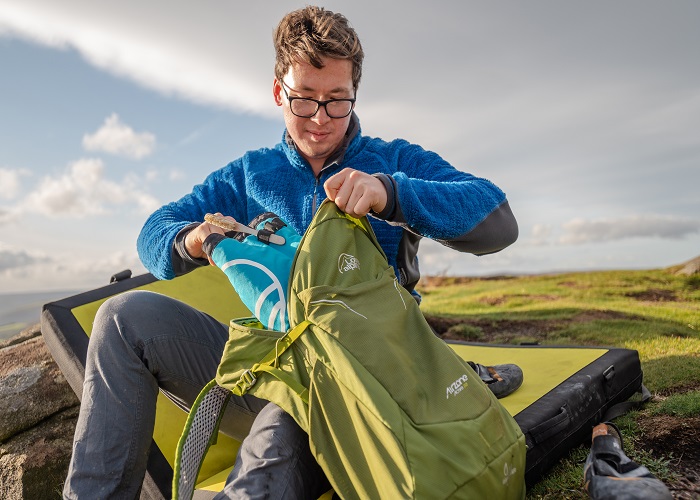Essentials for Every Walker
Walking is a great way to see the British countryside! It’s also a fantastic low impact exercise, which is loads of fun and beyond a few basic gear essentials, won’t cost you much. When walking in the great outdoors its important to be prepared including knowing your route, taking enough fluids and informing others of where you’re going. Whether you’re off for a weekend hike or a local stroll, check out these 10 essentials every walker should have in their rucksack.
Each year Mountain Rescue are asking the public to be more prepared on the hills as so many head out with the wrong gear, and end up needing to call out the rescue team for incidents which can easily be avoided. Mountain Rescue receives no government funding and is run on the time of volunteers and the funding of donations. To make sure this time and money is spent on real emergencies, it’s important we try to cut out any incidents which we can avoid through preparation.
A handbag or pocket with your phone and car keys might be enough for a simple dog walk, but if you’re heading out on a day hike, it’s important to carry a few more items, many of which you may not need all the time, but will serve you well in emergency situations.

1. Navigation
Lost hikers cause a lot of mountain rescue call outs, and many issues people have when hiking can be reduced by simply knowing where you are going. Handheld GPS systems are fantastic, they’re a great space saver and can hold thousands of maps in a simple small unit. GPS has been accused of making us a little lazy, many people no longer can use a map and compass, most won’t check out their route pre-walk and will rely on a GPS system. If for some reason the battery on your GPS dies, it’s a great idea to have a back up map and compass in your rucksack to safely navigate your way back to where you came from. If map and compass is your first choice, then make sure you take something to keep it dry.
2. Extra Clothing
The layering system is a walkers best friend, depending on the weather we would always advise taking extra layers because the weather at the bottom of the mountain is often very different to the weather at the top. Always take a waterproof with you, even if it stays stuffed in your pack – it’s better to be safe than sorry. In colder months we would advise packing gloves and hats also.


3. First Aid Kit
Being able to look after yourself and fellow hikers can keep simple injuries from hindering your trip. As well as a standard first aid kit, we’d also recommend sun cream and insect repellent. If you’re on medication of any kind, we’d also recommend taking some spares.
4. Nutrition
Walking might see, easy, but it will soon burn off calories and in turn burn away your energy. In many outdoor shops you’ll notice high sugar or high carb snacks, these are a great source of energy. Look for energy hits like Kendal mint cake, flapjacks, protein bars, dried fruits, nuts & seeds to keep your energy levels topped up.


5. Hydration
Dehydration will cause you all sorts of problems when walking, many people think that a small bottle of water from the shop will suffice on a multi-hour walk, but in reality you should be looking toward around 2 litres of water for around 4 hours of walking. Staying hydrated and energised will keep your mind sharp and help you make the right decisions.
6. Lighting
This is important all year round, but especially in the winter months. If you miss-time your walk and end up walking after the sun has set, then a headtorch or torch can help you find your way. It’s also a great way to signal for help.


7. Spare Laces
Keeping your walking boots tied properly will help prevent foot injuries, if your boot lace snaps then it’s always good to be carrying spares in the pocket of your rucksack.
8. Waterproofs
The great British weather is unpredictable and so we highly recommend remaining prepared for rain. A dependable waterproof jacket and even waterproof trousers are essentials for any walker exploring the UK.


9. Survival Bag
A survival bag is purely for emergencies, these heavy duty bags can help protect you against the elements while you wait for help. They’re only a few pounds and take up no space at all in your pack.
10. Emergency Contact
Simply writing down some vital information could be a huge help to you and your rescuer. If for some reason you end up knocked out, or unable to respond, then it’s important for your rescuer to be able to identify you, and know who to call as an emergency contact to update about your status. If you have any medical needs, or allergies, it’s also good to mention these to make sure, should you need it that you get the correct care.

Extras to Consider
Multi-tool
A multitool isn’t just for dads to show off around the dinner table at Christmas, they have genuine uses and keeping a good one in your pack can give you instant access to scissors, a knife among the many other tools on offer.
Power pack
We wouldn’t recommend using navigation on mobile phones as phone batteries can be temperamental. If you’re heading to the top for that epic selfie, then there’s a good chance your phone may die during the day. Keeping a fully charged power pack in your pack will allow you to keep using your phone. Ideal for emergency situations.
Final note..
Preparation is essential to any successful walk. Remember to explore the outdoors responsibly, take the gear you need and learn some basic navigation skills. Finally, don’t underestimate the weather; the conditions can change quickly so check the conditions before you head out.
